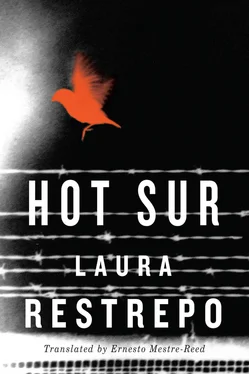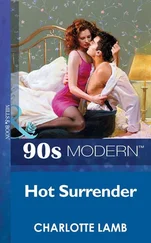Laura Restrepo - Hot Sur
Здесь есть возможность читать онлайн «Laura Restrepo - Hot Sur» весь текст электронной книги совершенно бесплатно (целиком полную версию без сокращений). В некоторых случаях можно слушать аудио, скачать через торрент в формате fb2 и присутствует краткое содержание. Год выпуска: 2015, Издательство: AmazonCrossingEnglish, Жанр: Современная проза, на английском языке. Описание произведения, (предисловие) а так же отзывы посетителей доступны на портале библиотеки ЛибКат.
- Название:Hot Sur
- Автор:
- Издательство:AmazonCrossingEnglish
- Жанр:
- Год:2015
- ISBN:нет данных
- Рейтинг книги:5 / 5. Голосов: 1
-
Избранное:Добавить в избранное
- Отзывы:
-
Ваша оценка:
- 100
- 1
- 2
- 3
- 4
- 5
Hot Sur: краткое содержание, описание и аннотация
Предлагаем к чтению аннотацию, описание, краткое содержание или предисловие (зависит от того, что написал сам автор книги «Hot Sur»). Если вы не нашли необходимую информацию о книге — напишите в комментариях, мы постараемся отыскать её.
María Paz is a young Latin American woman who, like many others, has come to America chasing a dream. When she is accused of murdering her husband and sentenced to life behind bars, she must struggle to keep hope alive as she works to prove her innocence. But the dangers of prison are not her only obstacles: gaining freedom would mean facing an even greater horror lying in wait outside the prison gates, one that will stop at nothing to get her back. Can María Paz survive this double threat in a land where danger and desperation are always one step behind, and safety and happiness seem just out of reach?
Hot Sur — читать онлайн бесплатно полную книгу (весь текст) целиком
Ниже представлен текст книги, разбитый по страницам. Система сохранения места последней прочитанной страницы, позволяет с удобством читать онлайн бесплатно книгу «Hot Sur», без необходимости каждый раз заново искать на чём Вы остановились. Поставьте закладку, и сможете в любой момент перейти на страницу, на которой закончили чтение.
Интервал:
Закладка:
“You smell like cold soup,” he told Cleve when he returned. “No doubt you were sticking your nose into that place.”
From Cleve’s Notebook
I find the idea that salvation can be found through writing trite. I get annoyed when literature is treated as a cult, or culture a religion, or museums temples, or novels bibles and writers prophets. And I can’t stand those lefties who pretend to speak for “those who have no voice,” or those well-known, more “right-minded” writers who descend from their towers for a few hours every month so that America sleeps a little better thinking that in fact things are not so bad for prisoners in this country, that they have stopped being so bad and have become a little better because someone has had the charity of teaching them how to write. In the past, prisoners looking for a miracle recited an Our Father, studied the Talmud, or paid a good lawyer. Now they write memoirs. And that’s fine, as long as no one tries to sell them the fact that by doing so they’re going to be happy or rich or forgiven by a society that will take them in like black sheep washed clean by the sacrament of literature. The only truth is that being a prisoner is a fucking misery. And yet, I have great hopes now that they have hired me to teach a writing workshop for the prisoners at Manninpox. There has to be an honest way to do it, a simple way to serve as a bridge so that they can do it for themselves, tell their stories, forgive themselves for whatever they have done or failed to do. Walter Benjamin said that narrative is the language of forgiveness. I want to believe that. And I’d like to make it possible for them to at least try.
Interview with Ian Rose
When he finished reading the manuscript, that very morning Ian Rose went into town, made a few photocopies and sent one to Samuel Ming, the editor of Cleve’s graphic novels. Aside from being the boy’s best friend, Ming was striking in his indecipherable mixed-race looks; he looked Asian but had dreadlocks, with a pair of tiny slanted eyes alongside an imposing Arab nose and large square teeth behind lips of a feminine delicacy. Rose the father sent him the manuscript with a note asking if he thought it was publishable, perhaps as an eyewitness account, or a denunciation, or maybe even as a novel. A few days later, when Ming let him know that he had looked at it, Ian Rose got in his Ford Fiesta and drove to New York City to talk with him personally.
“I don’t know what to tell you, Mr. Rose,” Ming told him honestly. He felt bad to see how, since Cleve’s death, the father seemed to have aged ten years, poor old man. Why add to the pain by telling him more of this dark story, and how could he warn him not to dig around too much, lest he find skeletons in the closet, so he decided to feign ignorance and not tell the old man that he was already familiar with this story. “Let’s see, Mr. Rose, how do I put it? Look, I don’t think it’s worth it to dwell on this too much. Take a trip, go to a beach and get some sun, give yourself the gift of two weeks in Paris, treat yourself to that. As for the manuscript you sent, I suggest that we leave well enough alone. Look, it’s clear that this young woman wants the details of, let’s say, her autobiography, known. And it seems that Cleve would have liked to help her. But the truth is that I don’t see how it’s possible. The text is unfinished. She’s unknown, not to mention getting her permission, which we haven’t considered. Besides, it’s not my genre…”
Ming, whom I have had the chance to interview also, assures me that in that moment he wanted to tell Mr. Rose about the dangers, lethal ones, that would come with publishing so much material, but decided not to burden him with more drama and simply said he couldn’t publish it.
“I’m sorry; I’ve put you in a spot,” Rose said to the editor.
“Not at all, Mr. Rose,” Ming replied, tapping him on the shoulder, which felt very bony, and thinking how true it was that there are sorrows that end up killing you.
Back at the house in the mountains, Ian Rose placed the package with the manuscript back on the bed in the attic.
3. From María Paz’s Manuscript
America doesn’t really exist, Mr. Rose. America is only in the dreams of those of us who dream of America. I know that now, but it took me years to figure it out. And to tell you the truth, it wasn’t me who discovered it but Holly, you know, Holly Golightly, my heroine, from Breakfast at Tiffany’s , although I’m nothing like her, or maybe just because of this, because it was you who taught me that not even Holly was like Holly, because Holly was in fact Lula Mae. After arriving in Manhattan she became chic and sophisticated, came up with the idea of the little black dress, the sunglasses to hide the all-nighter, and the cigarette case, all that. But the truth was that she had been born in Tulip, the shittiest little town in Texas, where she was known as Lula Mae. So Holly was a hick like me, which I didn’t like so much when I found out, I couldn’t see admiring a girl who was so much like me. Of course, that’s according to the book that you made us read, Mr. Rose, not according to the movie. If you remember, I made quite a scene in class because I was so disappointed with the ending of the novel. I thought it was a trick. I had seen the movie with Audrey Hepburn at least eight times, and it has a happy ending, one in which you feel as if you’re on air, dreaming, and then you come along telling us this is not the original story, because Truman Capote had not wanted for Holly to marry at the end, but to leave. Go far from there and continue looking for America, not finding it anywhere. And you also said that in the movie Audrey Hepburn opened her eyes too wide, as if they weren’t big enough already.
“But she’s very pretty.” I stood up for her.
“Yes, but she doesn’t have to keep her eyes so wide open. She seems to want to convince us that she’s a bit dumb, and is quite good at it.”
“Holly is more sad than she is dumb.”
“The one in the book. The one in the movie is dumber than she’s sad. Capote didn’t like her. He thought she wasn’t anything like the Holly of his novel,” you said, and that’s as far we got in our talk because the bell rang and I had to return to my cell.
But now I have to ask you a favor, don’t reveal my true identity. That is, if this thing I’m sending you is ever published. And I’m sorry if it seems presumptuous to imagine such things, but it’s your fault. You told us in class that the story of anyone’s life deserves to be told, and the protagonists of novels are common everyday people like us. That’s what you told us, and of course it sets things off in our heads, fills us with ideas. Illusions. Anyway, please don’t use my real name, or any other people’s, or places, nothing that could be used to identify me. Give me another name; do me that favor. Not for me, for my sister, who is the sensible one and gets upset when she hears things she’d rather not hear. After all, Holly has others call her Holly when her real name is Lula Mae, and if changing her name works for her, it works for me too. I don’t know if you remember my name, it has been a while, or maybe not so long, although it seems like years, as if a huge chunk of time has passed since then, you out there on one side and me in here on the other. You don’t know how much you are still with me, though. Here in Manninpox, memory is our only plaything. But it’s better if you have forgotten my real name, and whatever the case, it’s better if I don’t remind you. I’ll only say this, I was christened with the name of a country. Is that weird? It’s a Hispanic thing, you know, as the Americans say, naming people after countries, or animals, or virgins and saints. But you might understand, because although you are a gringo you weren’t spared, with that last name of a flower. So call me whatever you want, as long as it is still a country, or a city, like Roma or Filadelfia, or Samarcanda, say. The fact is that it is a tradition in our family. I don’t have to go any further than my great-grandmother, poor woman, who was named America María. But she revenged herself by christening her five children with names also pulled from an atlas: the oldest Germania María; then Argentina María; Libia María and Italia María, who were twins; and the youngest, a wretched woman who in time would become my grandmother, was to be called Africa María, a name that apparently sealed her destiny. The tradition continued with my mother, Bolivia María, and reached me. Not even my sister, who is younger, was saved. The boys were given real names, like everyone else, such as Carlos José, my uncle; Luis Antonio, my other uncle; Aurelito, my aunt Niza’s husband; my cousin Juan de Dios. But all us girls were saddled with geographic names, as if instead of a family we were a map. A whimsical tradition, from people who never traveled, all of them solid country folk, until my mother, Bolivia María, decided to take off. She was the first one to discover the world. The rest of them, forget it. It was so bad that my aunt Libia didn’t even know on what side of the planet the place she was named after was, and you should have seen how enraged she was when she found out that Libya was a Muslim country, and a communist one to boot. They’re lying, they just want to shock me, she said, making the sign of the cross. She was so Catholic she’d rather have been named Fátima, or Belén, or at least Roma, but not the pagan Roma of Nero, but the apostolic Roma of Peter. As you will have noted, Mr. Rose, all of us ended up with the middle name María so that the Virgin would protect us, as they said. A Hispanic thing, I’m telling you, saddling people with this trail of names, all so weird, or the same name repeated for each member of the family, or a combination of both, as was our lot. I know it’s a provincial thing, ridiculous. You don’t have to tell me. But for some reason I’d rather not abandon it, maybe because behind each María with a geographic name there has been a strong woman not to be messed with.
Читать дальшеИнтервал:
Закладка:
Похожие книги на «Hot Sur»
Представляем Вашему вниманию похожие книги на «Hot Sur» списком для выбора. Мы отобрали схожую по названию и смыслу литературу в надежде предоставить читателям больше вариантов отыскать новые, интересные, ещё непрочитанные произведения.
Обсуждение, отзывы о книге «Hot Sur» и просто собственные мнения читателей. Оставьте ваши комментарии, напишите, что Вы думаете о произведении, его смысле или главных героях. Укажите что конкретно понравилось, а что нет, и почему Вы так считаете.












